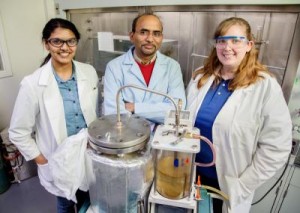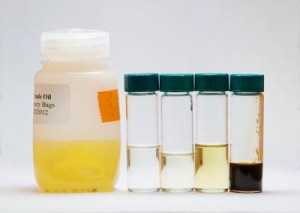
Yay, another valuable use for recycled plastic bags! Instead of throwing away 100 billion of them a year, Americans might want to look into gassing up their SUVs with fuel made from the petroleum-based bags.
Researchers at the University of Illinois Urbana-Champaign (go Illini!) say that plastic shopping bags can be converted into diesel, natural gas and other useful petroleum products—with less energy than it takes to refine crude oil into the same fuels.
“The conversion produces significantly more energy than it requires and results in transportation fuels – diesel, for example – that can be blended with existing ultra-low-sulfur diesels and biodiesels. Other products, such as natural gas, naphtha (a solvent), gasoline, waxes and lubricating oils such as engine oil and hydraulic oil also can be obtained from shopping bags,” the U of I news bureau said in a release.
As reported in the journal Fuel Processing Technology, senior research scientist Brajendra Kumar Sharma and his colleagues refined the recycled plastic bags by heating them in an oxygen-free chamber called a pyrolysis.
“You can get only 50 to 55 percent fuel from the distillation of petroleum crude oil,” Sharma said. “But since this plastic is made from petroleum in the first place, we can recover almost 80 percent fuel from it through distillation.”
Previous studies have used pyrolysis to convert plastic bags into crude oil, the news service said. Sharma’s team took the process further by separating the crude oil into component fuels, and testing them to see if they complied with national standards for ultra-low-sulfur diesel and biodiesel fuels.

Let’s let the scientist explain the results: “A mixture of two distillate fractions, providing an equivalent of U.S. diesel #2, met all of the specifications” after an antioxidant was added, Sharma said. “This diesel mixture had an equivalent energy content, a higher cetane number (a measure of the combustion quality of diesel requiring compression ignition) and better lubricity than ultra-low-sulfur diesel.”
The researchers were able to blend up to 30 percent of their plastic-derived diesel into regular diesel without any compatibility problems.
It’s too early to predict whether the recycling process could be adopted on a wide scale—but if it is, our environment will surely benefit.
The U.S. Environmental Protection Agency reports that “the category of plastics which includes bags, sacks, and wraps was recycled at about 11 percent” based on 2011 data. That means 11,000,000,000 bags were recycled, but 89,000,000,000 ended up in landfills, along the side of the road, in the Great Pacific Garbage Patch, and at the bottom of the Arctic Ocean.
Whole shopping bags resemble food for sea turtles, fish and other large marine animals. Some animals become entangled in plastic bags. That’s bad enough, but “over a period of time, this material starts breaking into tiny pieces, and is ingested along with plankton by aquatic animals,” Sharma said.
That’s why 100 percent of plastic bags in my house are recycled. What about yours?